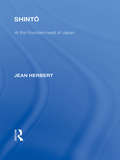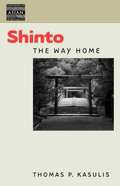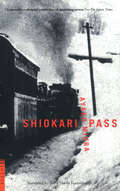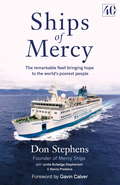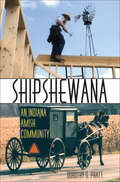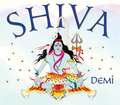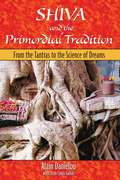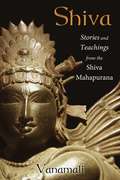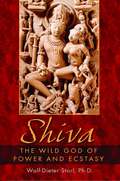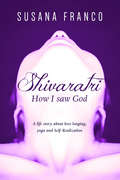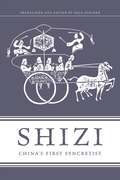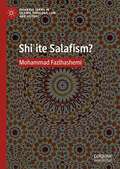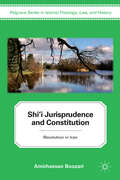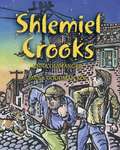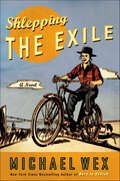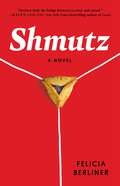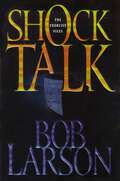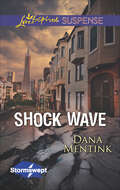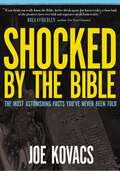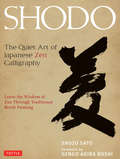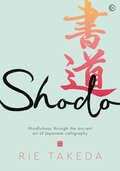- Table View
- List View
Shinto: At the Fountainhead of Japan (Routledge Library Editions: Japan)
by Jean HerbertShinto, the national indigenous religion of Japan has supplied Japan with the basic structure of its mentality and behaviour. Although its classical texts have been translated into English this volume was the first major study of this important religion. The book is a complete picture of Shinto, its history and internal organization, its gods and mythology, its temples and priests, its moral and worship. The volume also describes the metaphysics, mystic and spiritual disciplines and overall is one of the most authentic and authoritative surveys of Shinto of the twentieth century.
Shinto: The Way Home (Dimensions Of Asian Spirituality Ser.)
by Thomas P. Kasulis<P>This book originated at a party.<P> During the East-West Philosophers Conference held in Honolulu in January 2000, a small number of us philosophers were gathered in Henry Rosemont's temporary quarters at the East-West Center's Lincoln Hall.<P> Henry is both an old friend and respected colleague, not to mention most gracious host.
Shiokari Pass
by Bill Fearnehough Ayako Miura Sheila FearnehoughBased on a true story, Shiokari Pass is a moving tale of love eclipsed by sacrifice and tragedy. The hero of this novel is the young and idealistic Nobuo Nagano, who finds himself forced to make a heart-rending decision, when he must choose between his childhood sweetheart, Fujiko, and his newly found Christian faith. Set in Hokkaido at the turn of the nineteenth century, when for the first time Western culture and ideas were beginning to challenge Japan's long-held traditions, Shiokari Pass takes an intriguing look at japanese life and thought of a hundred years ago. Filled with drama and featuring a spectacular climax amidst the snows of Hokkaido, the book was a bestseller in japanese and a successful motion picture as well. Based on the life of a high-ranking railway employee who was revered for his humanitarian deeds, Shiokari Pass offers a revealing glimpse of the long, hard road traveled by Japanese Christians.
Shiokari Pass
by Bill Fearnehough Ayako Miura Sheila FearnehoughBased on a true story, Shiokari Pass is a moving tale of love eclipsed by sacrifice and tragedy. The hero of this novel is the young and idealistic Nobuo Nagano, who finds himself forced to make a heart-rending decision, when he must choose between his childhood sweetheart, Fujiko, and his newly found Christian faith. Set in Hokkaido at the turn of the nineteenth century, when for the first time Western culture and ideas were beginning to challenge Japan's long-held traditions, Shiokari Pass takes an intriguing look at japanese life and thought of a hundred years ago. Filled with drama and featuring a spectacular climax amidst the snows of Hokkaido, the book was a bestseller in japanese and a successful motion picture as well. Based on the life of a high-ranking railway employee who was revered for his humanitarian deeds, Shiokari Pass offers a revealing glimpse of the long, hard road traveled by Japanese Christians.
Ships of Mercy: The remarkable fleet bringing hope to the world's poorest people
by Don StephensShips of Mercy tells the riveting true story of Mercy Ships, the astonishing fleet of hospital ships that sail the globe, bringing dramatic change to the lives of hundreds of thousands of people in the most impoverished and disease-stricken corners of the world.Ships of Mercy is a page-turner of the highest quality, an inspiring testimony both to the essence of the human spirit and God's amazing providence.It tells the story of a teenager's extraordinary vision brought to reality in the form of a multi-million dollar life-saving mission. It also tells the story of a family of people from diverse backgrounds who have sacrificed their comfort and security in order to perform remarkable acts of grace and kindness.
Ships of Mercy: The remarkable fleet bringing hope to the worlds poorest people
by Don StephensShips of Mercy tells the riveting true story of Mercy Ships, the astonishing fleet of hospital ships that sail the globe, bringing dramatic change to the lives of hundreds of thousands of people in the most impoverished and disease-stricken corners of the world.Ships of Mercy is a page-turner of the highest quality, an inspiring testimony both to the essence of the human spirit and God's amazing providence.It tells the story of a teenager's extraordinary vision brought to reality in the form of a multi-million dollar life-saving mission. It also tells the story of a family of people from diverse backgrounds who have sacrificed their comfort and security in order to perform remarkable acts of grace and kindness.
Shipshewana: An Indiana Amish Community
by Dorothy O. PrattWhile most books about the Amish focus on the Pennsylvania settlements or on the religious history of the sect, this book is a cultural history of one Indiana Amish community and its success in resisting assimilation into the larger culture. Amish culture has persisted relatively unchanged primarily because the Amish view the world around them through the prism of their belief in collective salvation based on purity, separation, and perseverance. Would anything new add or detract from the community's long-term purpose? Seen through this prism, most innovation has been found wanting.Founded in 1841, Shipshewana benefited from LaGrange County's relative isolation. As Dorothy O. Pratt shows, this isolation was key to the community's success. The Amish were able to develop a stable farming economy and a social structure based on their own terms. During the years of crisis, 1917-1945, the Amish worked out ways to protect their boundaries that would not conflict with their basic religious principles. As conscientious objectors, they bore the traumas of World War I, struggled against the Compulsory School Act of 1921, negotiated the labyrinth of New Deal bureaucracy, and labored in Alternative Service during World War II. The story Pratt tells of the postwar years is one of continuing difficulties with federal and state regulations and challenges to the conscientious objector status of the Amish. The necessity of presenting a united front to such intrusions led to the creation of the Amish Steering Committee. Still, Pratt notes that the committee's effect has been limited. Crisis and abuse from the outer world have tended only to confirm the desire of the Amish to remain a people apart, and lends a special poignancy to this engrossing tale of resistance to the modern world.
Shira and Esther's Double Dream Debut
by Anna E. Jordan"This book is pure magic."—Maulik Pancholy, actor and Stonewall Honor-winning author The switcheroo fun of The Parent Trap meets the showbiz spirit of The Marvelous Mrs. Maisel in this timeless coming-of-age story about family, friendship, and following your dreams. When Shira and Esther first meet, they can hardly believe their eyes. It’s like looking in a mirror! But even though they may look identical, the two girls couldn’t be more different. Shira dreams of singing and dancing onstage, but her father, a stern and pious rabbi, thinks Shira should be reading prayers, not plays. Esther dreams of studying Torah, but her mother, a glamorous stage performer, wishes Esther would spend more time rehearsing and less time sneaking off to read books. Oy vey! If only the two could switch places . . .Would Shira shine in a big-time televised talent show? Would Esther’s bat mitzvah go off without a hitch? What’s a little deception, when it means your dreams might finally be within reach? One thing is certain: Shira and Esther are going to need more than a little chutzpah to pull this off. But if they do, their double dream debut is sure to be the performance of a lifetime. ★ "Adult readers may wish they were young again, so this could instantly become their favorite book." ― Kirkus Reviews, starred review ★ "Readers will love this sparkling intergeneration ode to chutzpah and Jewish Joy."—Publishers Weekly, starred review FUNNY AND HEARTFELT FRIENDSHIP BOOK: Brimming with heart and humor, this unforgettable novel from a compelling new voice in young adult literature will make readers laugh, cry, and come back for more knishes. FAMILY, FRIENDS, AND COMMUNITY: Themes of connection, unity, and the need for belonging will resonate with readers of all backgrounds. JEWISH COMING-OF-AGE: This book represents and celebrates many ways of being Jewish while also inviting non-Jewish readers to share in what makes the religion, culture, and community so wonderful.BRILLIANT EXTRAS: At the back of the book, a guide to Yiddish words and an author's note on the research and inspiration behind the story invites learning and discussion.Perfect for:Preteens and tweens looking for funny friendship booksParents, caregivers, educators, and librarians seeking Jewish children's booksJewish and bicultural readersReaders who enjoy young adult historical fiction booksReaders interested in theater, acting, music, and the artsHannukah gift, theater kid gift, or bat mitzvah gift for girls
Shiv: शिव
by Ashok Sharmaअनुकूलता सुख देती है और प्रतिकूलता दुख। एक ही वस्तु किसी को सुख देती है और किसी को दुख, किन्तु सुन्दरता वस्तु-निष्ठ है। जो कल्याणकारी है, वही सुन्दर है। वह किसी के दुख का कारण नहीं हो सकती यद्यपि वह कष्ट-साध्य हो सकती है। तप, कष्ट-साध्य है किन्तु कल्याणकारी है अत: सुन्दर है। शिवत्व का अर्थ है, प्रगति या कल्याण। अशिक्षा से शिक्षा की ओर, दरिद्रता से समृद्धि की ओर, निस्तेज से तेजस्विता की ओर प्रगति है। यह शिव है और सुन्दर है। ईश्वरत्व को साकार करने के प्रयास में भारतीय मनीषा ने शिव की अवधारणा प्रस्तुत की। यह पराभौतिक ज्ञान की ओर बढ़ने का एक प्रयास था। यह कहती है, शिव का हेतु ही सत्य है। शिवत्व ,सत्य की ओर ले चलता है। यत सत्यं तत् शिवम, यत शिवम तत् सुन्दरम्। शिव सदैव सुखद रूप से शीतल है, शान्त है, सुन्दर है और पवित्र है।
Shiva
by DemiWorshipped by millions of Hindus worldwide, Shiva (&“the auspicious one&”) is the god of love, righteousness, forgiveness, longevity, protection, health, and prosperity. He is said to bring good fortune, grace, and compassion. Shiva is depicted as clothed in ashes, with the crescent moon crowning his head, the holy river Ganges flowing from his matted hair, a third eye on his forehead, a serpent around his neck, and a tiger skin around his waist. As Nataraja, or &“Lord of the Dance&”, he controls the forces of creation, preservation, and destruction. Award-winning author, Demi, presents the life and teaching of this central god within the Hindu pantheon, replete with stunning illustrations that faithfully reflect the ancient traditions of Hindu painting and iconography. Also included is an appendix of Hindu prayers to the god Shiva and notes on his representation as &“Lord of the Dance&”.
Shiva and the Primordial Tradition: From the Tantras to the Science of Dreams
by Alain Daniélou Jean-Louis GabinAn extensive examination of the underpinnings of the Shaivite Tradition • Reveals the influence of Shaivism on the Western world • Discusses Shaivism’s understanding of sacred sexuality • Presents the connections between Vedic poetry and metaphysics In Shiva and the Primordial Tradition, Alain Daniélou explores the relationship between Shaivism and the Western world. Shaivite philosophy does not oppose theology, cosmology, and science because it recognizes that their common aim is to seek to understand and explain the nature of the world. In the Western world, the idea of bridging the divide between science and religion is just beginning to touch the edges of mainstream thought.This rare collection of the late author’s writings contains several never-before-published articles and offers an in-depth look at the many facets of the Samkhya, the cosmologic doctrines of the Shaivite tradition. Daniélou provides important revelations on subjects such as the science of dreams, the role of poetry and sexuality in the sacred, the personality of the great Shankara, and the Shaivite influence on the Scythians and the Parthians (and by extension, the Hellenic world in general). Providing a convincing argument in favor of the polytheistic approach, he explains that monotheism is merely the deification of individualism--the separation of humanity from nature--and that by acknowledging the sacred in everything, we can recognize the imprint of the primordial tradition.
Shiva: Stories and Teachings from the Shiva Mahapurana
by VanamaliThe traditional understanding of Shiva told through stories and teachings from the Shiva Mahapurana • Explains Shiva’s contradictory forms, such as destroyer or benefactor, and how his form depends on the needs of the devotee • Reveals how Shiva’s teachings allow one to see through the illusions at the root of all grief and alienation in human life • Explores Shiva’s relationships with Durga, Shakti, Sati, and Parvati and with his sons Ganesha and Kartikeya Shiva, the most ancient and complex deity of the Hindu pantheon, has been portrayed in many contrasting lights: destroyer and benefactor, ascetic and householder, wild demon slayer and calm yogi atop Mount Kailash. Drawing from the Hindu sacred text the Shiva Mahapurana--said to be written by Shiva himself--Vanamali selects the essential stories of Shiva, both those from his dark wild side and those from his benevolent peaceful side. Vanamali discusses Shiva’s many avatars such as Shambunatha and Bhola, as well as Dakshinamurti who taught the shastras and tantras to the rishis. She explores Shiva’s relationships with Durga, Shakti, Sati, and Parvati and with his sons Ganesha and Kartikeya. Examining Shiva’s acceptance of outsiders, Vanamali explains why ghosts and ghouls are his attendants and why his greatest devotees are demon kings, like Ravana. She includes famous Shiva stories such as the Descent of the River Ganga and Churning the Milky Ocean as well as those that reveal the origin of the festival of lights, Diwali; his creation of the cosmic couple, or hierogamos; and how Shiva and Parvati taught the world the secrets of Kundalini Shakti. The author also draws upon Shaivite teachings to illustrate the differences between Western science and Vedic science and their explanations for the origins of consciousness. Integrating Shiva’s two sides, the fierce and the peaceful, Vanamali reveals that Shiva’s form depends on the needs of the devotee. Understanding his teachings allows one to see through the illusions at the root of all grief and alienation in human life, for Shiva is the wielder of maya who does not fall under its spell. While Ganesha is known as the remover of obstacles, Shiva is the remover of tears.
Shiva: The Wild God of Power and Ecstasy
by Wolf-Dieter StorlAn extensive look at all the aspects of multi-natured Shiva• Explores the shamanic roots of world spirituality as exemplified by this Hindu god who shares many of the attributes of the Norse Odin and the Celtic Cernunnos• Looks at Shiva’s relation to contemporary culture, Tantra, and the dualistic religions of the WestTo his devotees Shiva is the entire universe and the core of all beings. Hindu myth shows him appearing at the beginning of creation as a giant pillar of fire from which this world sprang forth. Yet he is also the most approachable of gods, for he is the lover of lovers and the devotee of his devotees. Of the 1,008 names of Shiva, Pashupati, Lord of Animals, is one of the most common. His special relation to animals along with his trickster nature reveal the deep connection of Shiva to shamanism and other gods such as the Norse Odin and the Celtic Cernunnos that came out of the Paleolithic traditions.Ethnologist Wolf-Dieter Storl was first captivated by Shiva when he was in India as a visiting scholar at Benares Hindu University. In this book he invites readers to join in the lively and mythical world of Shiva, or Mahadev, God of All Gods. Shiva is a study in contrasts: As the lord of dance he looses himself in ecstatic abandon; with his consort Parvati he can make love for 10,000 years. Both men and women worship him for his ability to unite and balance masculine and feminine energies. But as the ascetic Shankar he sits in deep meditation, shunning women, and none dare disturb him lest he open his third eye and immolate the entire universe. Lord of intoxicants and poisons, he is the keeper of secret occult knowledge and powers, for which he is worshipped by yogis and demons alike. Shiva dances both the joy of being and the dance of doom--but in every aspect he breaks through the false ego to reveal the true self lying within. This is his true power.
Shivaratri – How I saw God: A life story about love longing, yoga and Self-Realization
by Susana FrancoShivaratri - How I saw God is a story of personal and spiritual development, as well as testament to a passage from bad karma to good. The author alerts us to the existence of an intelligent force that moves everything in the universe, and to the fact that suddenly anything in our lives can change. With her mind completely lost after a troubled life, Susana decides to travel to India where she is charmed and somehow feels reborn into a new life. Her experiences in the main religious centres of Hinduism, Sikhism and Buddhism; a meeting with the Dalai Lama; and a whirlwind of emotions that cause her immense inner suffering, motivate her to improve herself spiritually. Meanwhile, Susana meets her twin soul who ends up leaving her. But fate is pragmatic, insisting on coincidences and discreetly pointing the way to Africa. The action of this story takes place amid the bustle and smells of India, the magic of Africa and chaos of a Portugal submerged in financial crisis. Yoga and Transcendental Meditation appear as an escape from reality by the author who lives immersed in an ocean of existential questions. The answers to all these questions come to her through karmic astrology, past life regression and two trips to Uganda. Finally, Susana returns to India where meets her Guru who invites her to plunge deeper into Transcendental Meditation and to see the Divinity. This book tells a wonderful story that is not just a story of life guided by delivery and abandonment, love and loneliness, altruism and disappointment. This story is also about self-knowledge, Karma, Dharma, Faith and evolution of the soul. It is above all, a story that shows us how meeting with our spirituality becomes a refuge in our everyday problems.
Shizi: China's First Syncretist
by Paul FischerBy blending multiple strands of thought into one ideology, Chinese Syncretists of the pre-imperial period created an essential guide to contemporary ideas about self, society, and government. Merging traditions such as Ruism, Mohism, Daoism, Legalism, and Yin-Yang naturalism into their work, Syncretists created an integrated intellectual approach that contrasts with other, more specific philosophies. Presenting the first full English translation of the earliest example of a Syncretist text, this volume introduces Western scholars to both the brilliance of the syncretic method and a critical work of Chinese leadership.Written by Shi Jiao, China's first syncretic thinker, during the Warring States Period of 481 to 221 BCE, Shizi is similar to Machiavelli's The Prince in that it dispenses wisdom to would-be rulers. It stresses the need for leaders to be detached and objective. It further encourages self-cultivation and effective government, recommending that rulers maintain self-discipline, hire reliable people, delegate power transparently, and promote others in an orderly fashion. The people, it is argued, will emulate their leader's wisdom and virtue, and a just and peaceful state will result. Paul Fischer provides an extensive introduction and a chapter-by-chapter summary and analysis of the text—outlining the importance of syncretism in Chinese culture—and explores the text's particular features, authorship, transmission, loss, and reconstruction over time. The Shizi set the stage for a long history of syncretic endeavor in China, and its study provides insight into the vital traditions of early Chinese philosophy. It is also a template for interpreting other well-known works, such as the Confucian Analects, the Daoist Laozi, the Mohist Mozi, and the Legalist Shang jun shu.
Shiʿite Salafism? (Palgrave Series in Islamic Theology, Law, and History)
by Mohammad FazlhashemiThis book is about the emergence of a stream of ideas in the 1930s and 1940s within Imamiyya Shiʿite context, focusing primarily on the thought of Shariʿat Sangelaji (1891–1944), who harshly criticized a number of basic theological beliefs within Imamiyya Shiʿa. Accusing them of polytheism and superstition on account of their ideas about shifaʿa intercession, and their pilgrimage to the graves of the Shiʿite imams, he also criticized the belief that the twelfth imam al-Mahdi has been living in covertness since the 9th century, and that a number of historical figures will be resurrected upon his return to assist him in the final battle against the evil. Taking at once a theological and historical approach, Mohammad Fazlhashemi investigates whether Salafist mainstreaming thoughts, despite its hostile attitude towards Shiʿa Islam, had any influence over Shiʿite theology. He explores whether and what components of the Salafist tradition of ideas have been adopted by theologians within Imamiyya shiʿa or whether in fact whether these changes were the result of an internal theological tug-of-war within the Imamiyya Shiʿa that was influenced by the interwar modernization efforts. Fazlhashemi examines the characteristic features of this flow of ideas, its sources of inspiration, the reception of its thought, and the imprints it made on theological currents within Imamiyya shiʿa in Iran during its time and time thereafter.
Shi’i Jurisprudence and Constitution
by Amirhassan BoozariFocusing substantially on the relation between the concept of constitutionalism and Islamic Law in general and how such relation is specifically reflected in the Shiite jurisprudence, this volume explores the juristic origins of constitutionalism, especially in the context of 1905 Constitutional Revolution in Iran.
Shlemiel Crooks
by Anna OlswangerIn the middle of the night on a Thursday, two crooks--onions should grow in their navels--drove their horse and wagon to the saloon of Reb Elias Olschwanger, at the corner of 14th and Carr streets in St. Louis. This didn't happen yesterday. It was 1919." So begins Anna Olswanger's charming folktale Shlemiel Crooks, the story of Reb Elias and the thieves who try to steal his Passover wine. Based on a true story, Shlemiel is an imaginative introduction for young children to the history of Passover, as Pharaoh and a town of Jewish immigrants play tug-of-war with wine made from grapes left over from the exodus from Egypt. A modern-day parable, Shlemiel has a music all its own. No other children's book has Pharaoh's ghost coming back to "pull one over on the Jews," nosy neighbors making a "shtuss" outside, and a talking horse that sounds like it has a "little indigestion." In its Yiddish-inflected English, punctuated by amusing curses, young readers hear the language of a Jewish community of another time.
Shlepping the Exile: A Novel
by Michael WexSvelte and supple as unleavened bread, Shlepping the Exile rends the shmaltz from Jewish fiction and replaces it with a pound of real flesh. It's the story of Yoine Levkes, a hassidic boy of the Canadian prairies, his refugee parents, and the Jewish community of Coalbanks, Alberta in the late 1950s. Confronted with dying people, an ailing culture, the perils of near-orphanhood and the allures of Sabina Mandelbroit, whose family doesn't keep the Sabbath, Yoine can no longer tell whether he's a human being or a loot-bag of conflicting traditions. He's too religious to be 'normal,' too 'normal' not to realize this, and too much of a kid to be able to make any sense of it. Shlepping the Exile is Michael Wex's inside portrait of orthodox, post-Holocaust Judaism in a place that it never expected to be.
Shmutz: A Novel
by Felicia Berliner&“Berliner finds the bridge between ecstatic and carnal.&” —Raven Leilani, New York Times bestselling author &“Clever, subversive, juicy, and surprising….A stunner!&” —Deesha Philyaw, author of The Secret Lives of Church Ladies In this witty, provocative, and unputdownable debut novel a young Hasidic woman on a quest to get married fears she will never find a groom because of her secret addiction to porn.Like the other women in her Brooklyn Hasidic community, Raizl expects to find a husband through an arranged marriage. Unlike the other women, Raizl has a secret. With a hidden computer to help her complete her college degree, she falls down the slippery slope of online pornography. As Raizl dives deeper into the world of porn at night, her daytime life begins to unravel. Between combative visits with her shrink to complicated arranged dates, Raizl must balance her growing understanding of her sexuality with the more conventional expectations of the family she loves. A singular, stirring, and compulsively readable debut novel, Shmutz explores what it means to be a fully realized sexual and spiritual being caught between the traditional and modern worlds.
Shock Talk: The Exorcist Files
by Bob LarsonThe engaging smile and easy manner of Billy McBride, TV talk show host, belies the deep pain he carries from childhood-being abandoned by his father. This old but still raw pain leaves Billy vulnerable to the life situation of show guest Allison Owens. Allison and her mother, Jenny, have come on the show desperately hoping to encounter some healing for their disintegrating relationship. Instead, the show erupts into unexpected chaos, as Allison still has wounds on her wrists from a recent suicide attempt.Billy attempts to help Allison, eventually resorting to exorcism for both of them. The plot takes many twists and turns, but results in each character finding spiritual freedom from pain in the past.
Shock Wave (Stormswept #1)
by Dana MentinkTRAPPED...WITH A KILLER? When an earthquake rips through San Francisco, the last person journalist Sage Harrington expects to run into is ex-soldier Trey Black. After what they survived in Afghanistan, she doesn't know if she can face him again. But now they're trapped in the bowels of a ramshackle opera house on a mission to find Sage's missing cousin. And they may not be the only ones. Someone is desperate to keep them from discovering the truth. With time running out and devastation and danger all around, Sage and Trey must put their trust in each other to make it out alive. Stormswept: Finding true love in the midst of nature's fury
Shocked by the Bible: The Most Astonishing Facts You've Never Been Told
by Joe KovacsShocked by the Bible sets the record straight with well-researched, controversial, myth-breaking assertions about what the Bible really does—and doesn&’t—say.And guess on which day the Bible says Jesus died. Believe it or not, the Good Book doesn't mention Friday, and even more surprisingly, while the Bible says Jesus rose from the grave, it does not say it occurred Sunday morning. Remember, Jesus' followers found an empty tomb then.But don't feel bad if you've always assumed otherwise. Like countless millions of people, you've just been misinformed, misled or even (dare we say) lied to about what the Bible actually says.In a stunning investigation, news veteran Joe Kovacs goes on a mission to help both Christians and non-Christians alike find out what the Bible really contains, and what it doesn't."Shocked by the Bible: The Most Astonishing Facts You've Never Been Told" is an educational juggernaut that relies solely on the Holy Bible to reveal hundreds of Scriptural facts that many people of all persuasions simply don't know. The book instantly skyrocketed to the No. 1 position in three Bible-related categories on Amazon.com."I'm among the biggest fans of the Bible of all time," says Kovacs. "My goal is to educate people about the solid truth of Scripture and to stop the spread of erroneous information. I want people to crack open their Bibles and see with their own eyes what's actually printed on the pages, and what's not. It's shocking!"According to Scripture, you won't find "Three Wise Men" mentioned anywhere in the story of Jesus' birth. For that matter, none are said to have shown up at the manger in Bethlehem. The truth straight from your own Bible is that an unspecified number of wise men first met Jesus as a "young child" in a "house," not a babe in a manger, and it might have been more than a year after He was born. Go ahead, look it up for yourself.Also, according to Scripture, you won't find a single mention of Easter eggs, but you will find God warning His people not to have anything to do with a pagan fertility goddess, whose name is synonymous with "Easter.""Yes, I'm a Bible-believing Christian," says Kovacs. "But I'm not here to convert anyone. People are free to believe whatever they wish and can come to their own conclusions. I just want to show them the biblical record is often very different from what many assume. Not only will Christians love this book, but I think Jews, Muslims and even agnostics and atheists will get a kick out of it as well."
Shodo
by Shozo Sato Gengo Akiba Roshi Shinya Fujiwara Alice Ogura SatoIn this beautiful and extraordinary book, Shozo Sato, an internationally recognized master of traditional Zen arts, teaches the Japanese art of calligraphy through the power and wisdom of Zen poetry. <P><P>Single-line Zen Buddhist koan aphorisms or zengo are one of the most common subjects for the traditional Japanese brush calligraphy known as shodo. Regarded as one of the key disciplines in fostering the focused, meditative state of mind so essential to Zen, shodo is practiced regularly by all students of Zen Buddhism in Japan. <P>After providing a brief history of Japanese calligraphy and its close relationship with the teachings of Zen Buddhism, Sato explicates the basic supplies and fundamental brushstroke skills that you'll need. He goes on to present thirty zengo, each with: An example by a skilled Zen monk or master calligrapherAn explanation of the individual characters and the Zen koan as a whole <P>Step-by-step instructions on how to paint the phrase in a number of styles (Kaisho, Gyosho, Sosho) A stunning volume on the intersection of Japanese aesthetics and Zen Buddhist thought, Shodo guides beginning and advanced students alike to a deeper understanding of this unique brush painting art form.
Shodo: The practice of mindfulness through the ancient art of Japanese calligraphy
by Rie TakedaThis is a beautiful guide to harmonize the body and mind connection through elegant Japanese calligraphy for fans of Ikigai and Wabi Sabi.SHO 書: to write, writing, calligraphy. DO 道: the path, the way or the Tao, the path of lifeThe ancient Japanese art of calligraphy is more than just a decorative skill; it is a revolutionary approach to mindfulness. This book is a beautiful introduction to Shodo, which shows how the movement of a brush channels energy through the body and mind, uniting both in harmony. What results on the paper is a true depiction of the present moment, a movement towards a more peaceful mindfulness.Shodo expert and professional calligrapher Rie Takeda shares the history, philosophy and craft of Shodo. Decorated throughout with her stunning art, Takeda begins with the basic brushstrokes, and builds up to drawing complete kanji, beautifully nuanced in both appearance and meaning. Introductory sections include practical information on what sort of ink, pens and brushes to use, how to prepare your space, how to sit and breathing exercises. This is alongside spiritual guidance, including the concept of Mushin (an undisturbed mind), Qi energy, and how to discover your unique inner quality.A final troubleshooting section allows you to identify what wobbles and imperfections in your lines can tell you about the various tensions and stresses in your body and mind.
